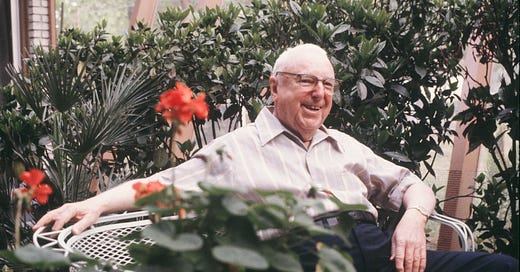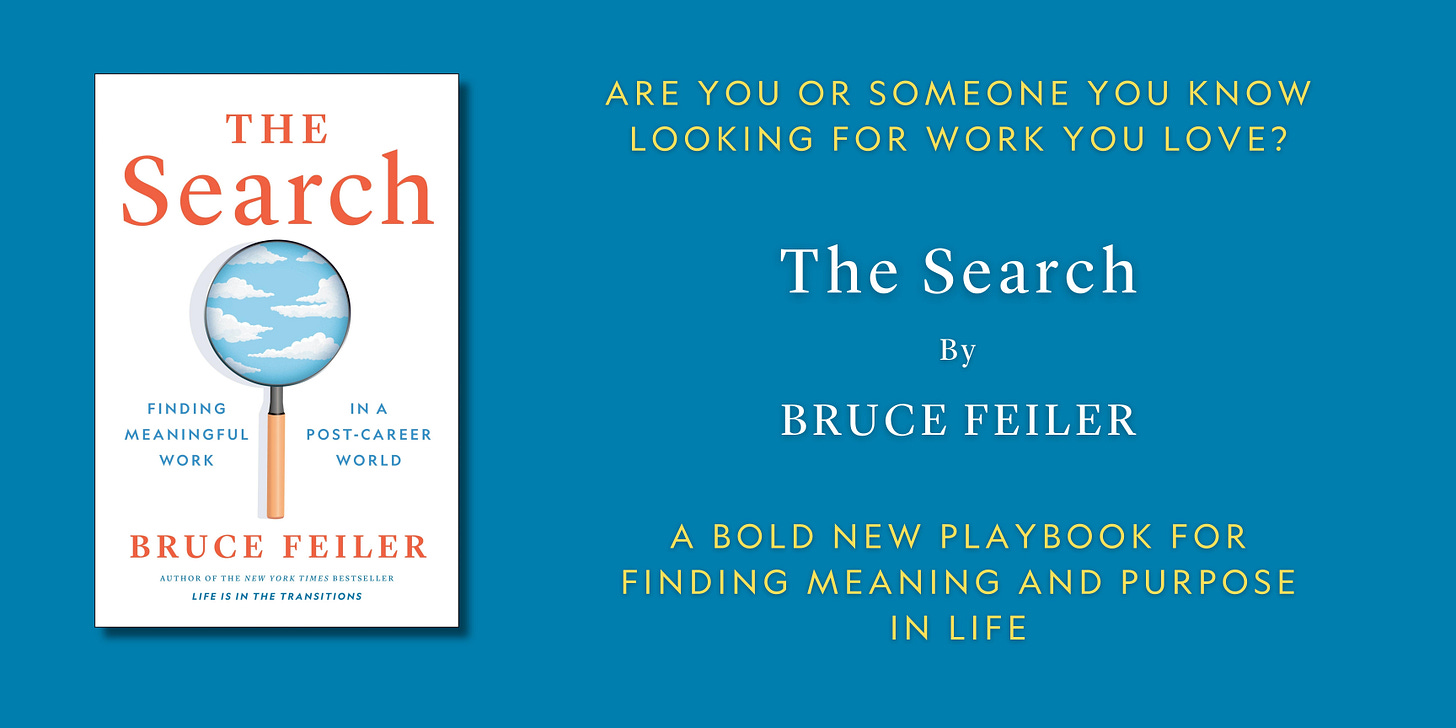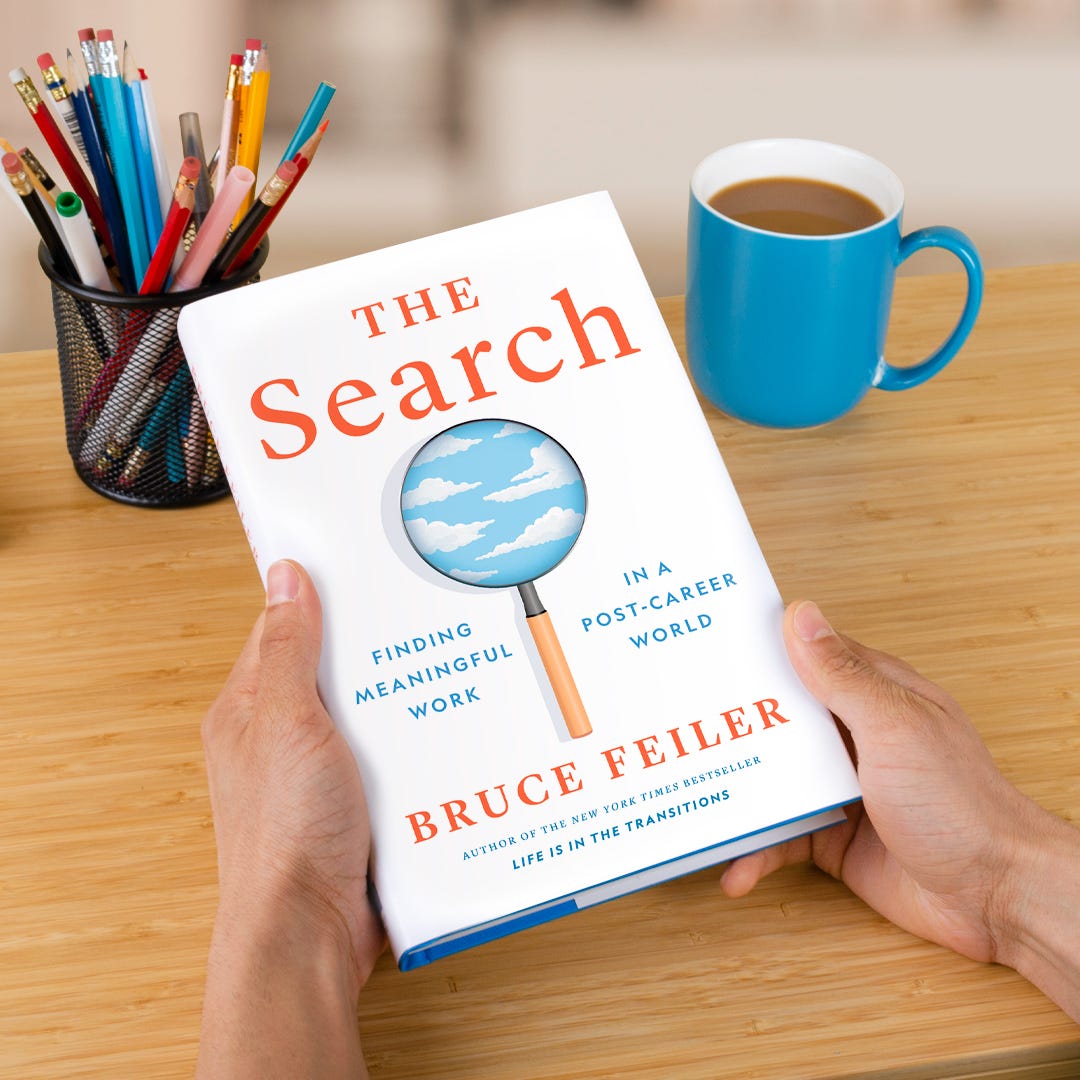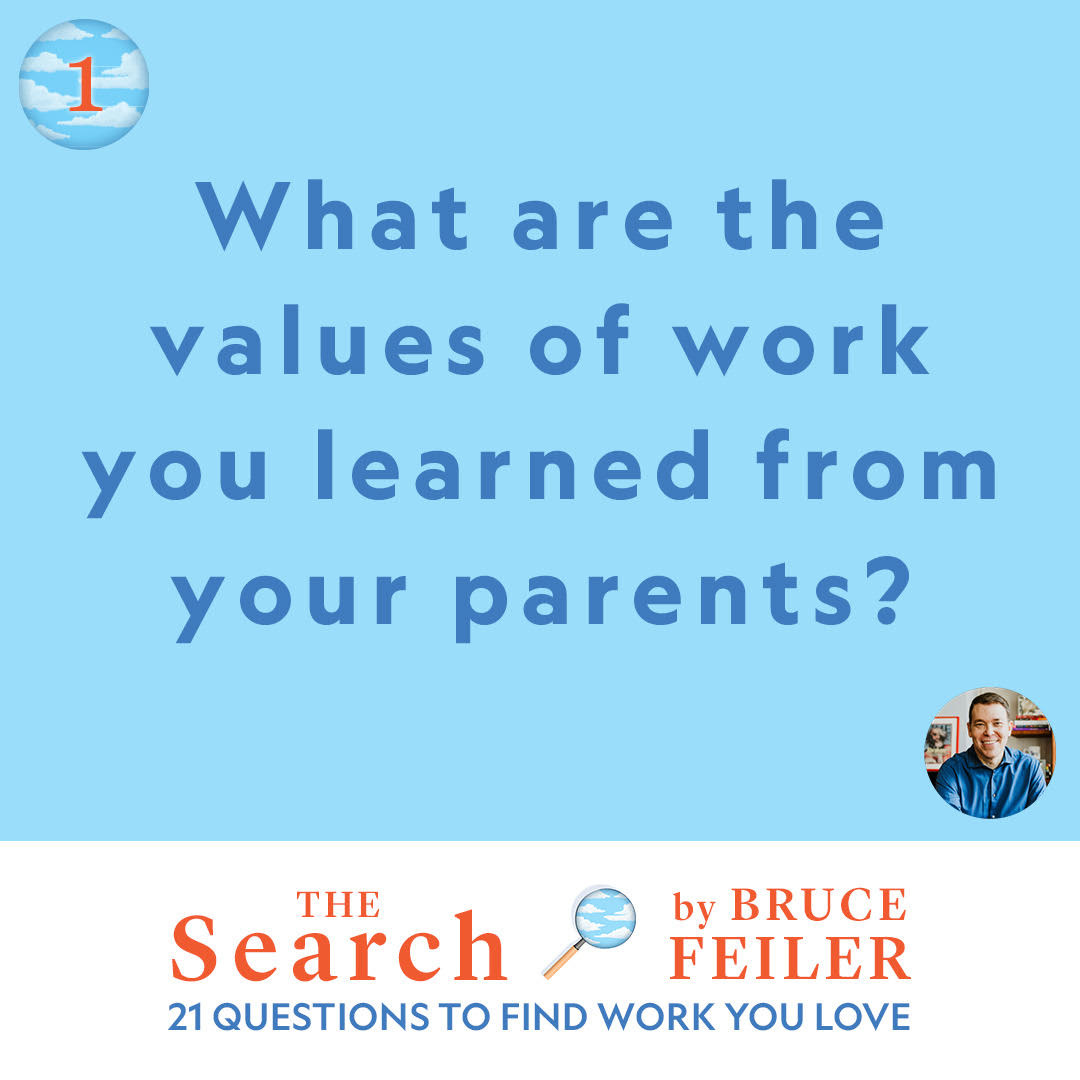Exclusive Sneak Peek at the Story That Inspired My New Book, THE SEARCH
An All-New Roadmap for Finding Meaning and Purpose in Your Life
My new book, THE SEARCH: Finding Meaningful Work in a Post-Career World, comes out on May 30th. It’s a bold new playbook for finding meaning and purpose in your life based on hundreds of life stories I’ve collected and analyzed over the last six years.
The first half of the book shows how a new generation of workers—younger, more female, more diverse—are busting the three lies about work and embracing the one truth: only you can write your own story of success. The second half of the book offers a toolkit for doing just that, ‘21 Questions to Find Work You Love.’
I’d love to share these ideas with you, but they’re embargoed for another few days as we have an absolutely amazing lineup of media coming soon. What I can do is share my own internal narrative of work I inherited from my family and how it shaped my life choices. A big part of THE SEARCH reveals that the people who are happiest and most fulfilled at work tap don’t just keep chasing the next rung of the ladder, they unearth the story they’ve been trying to tell since they were young.
They don’t just climb; they dig.
Before I share my own origin story of work, I’d like to make a direct plea (You know, kinda like those NPR or PBS pledge drives): The Nonlinear Life is a user-supported newsletter that I’m trying to keep free as long as possible. One way you can show your support is to think of anyone you know who feels stuck, confused, unhappy, or unsure about what they want to do with their life—and buy that person, or better yet, those people, a copy of THE SEARCH. I’m almost prepared to guarantee that it will change their life.
Those people might be a first-time mom, a new college grad, a soon-to-be-empty nester, a recent retiree; someone who’s looking for a change, a fresh start, a reboot, a reinvention; someone who wants to rethink their existing role, start a new role, plunge into a side job, or pursue a hope job (oops, sorry, one of those ideas I can’t explain yet).
Mostly they’re someone who wants more meaning out of work and is determined to achieve it. More than any book I’ve ever written, I believe THE SEARCH applies to more people, of more ages, and more backgrounds than I’ve ever spoken to before.
And now my own answer to one of those 21 questions: What are the upsides and downsides about work you learned from your parents?
When I was nine, I was summoned to a family ritual. Awakened by my mother on a Saturday morning, I dressed in baby-blue corduroys and a white dress shirt, stepped through the sliding glass door in back of our home in Savannah, Georgia, and walked the few steps to my grandparents’ house. My grandmother prepared her signature breakfast: one scrambled egg, one plate of hand-cut french fries, one glass of milk, and one Krispy Kreme glazed doughnut.
Afterward, I climbed into my grandfather’s Ford, and he drove seven miles per hour through a dozen stoplights to a one-story, white brick building downtown. Inside, behind a giant oak desk, I learned to file, type, and keep ledgers as tenants delivered monthly rent payments of eighteen or twenty-two dollars. Look them in the eye. Ask about their family. Thank them. All while my grandfather, in his suspenders and brown oxfords, kept his hand on my shoulder and his eye on my work.
At exactly noon, we would get back into the car, and Papa would tell stories—about the first car he drove in Mississippi, the first airplane he rode in Florida, the first air conditioner he enjoyed in Georgia. The message in those mornings could not have been clearer.
“Son, the most important thing in life is work.”
Not family, not faith, not love.
Work.
And work in a way that was part of a long line of traditions. Of building things and making sacrifices, of handshakes and hair tonic, of masculinity and industriousness.
But while I was listening to those stories and hearing those messages, I was harboring a misgiving. I didn’t dream of doing that kind of work. I didn’t want to tell that kind of story.
Instead, there was another place in that one-story building that contained an alternative script of my life. It was a walk-in bank vault from the Mosler Safe Company in Hamilton, Ohio. Inside was a file with my name on it kept by my father. It contained programs from my piano recitals, stacks of letters from summer camp (Who writes twelve-page letters home from camp? I did!), and stapled collections of every poem I ever wrote.
Every Saturday of my childhood I would walk through that sliding glass door, endure those long drives, and try to detangle those conflicting strands of my identity. The earnest, dutiful, expected life; the risky, alternative, creative one. The life at the desk or the one in the vault.
The linear path or the nonlinear one.
But just as my string of Saturdays ended, I received a chilling warning. Six weeks before I graduated from high school, my grandfather, soon after learning he had a chronic disease, scribbled a note—I cannot live a sick man—took a pistol, and shot himself.
He might as well have said, If I cannot work, I cannot live.
For me, the impact of that moment was that all those straight lines I had been raised to follow became a crypt I was determined to avoid. Three months later, I boarded a train for college and took one last trip on an old-fashioned, industrial line that my grandfather would have loved into a newfangled, postindustrial world he never would have understood, where all the lines are crooked and all the sources of meaning are scrambled.
A world where work is no longer defined by giant oak desks and well-polished oxfords.
But by countless personal vaults storing vats of untapped dreams.
A world where success cannot be written for you.
Success can be written only by you.
___
So what’s your answer to the first of the 21 questions: What are the upsides about work you learned from your parents? Please drop your answer in the comments below. I’ll also be posting one question every day until the book comes out on my Facebook and Linkedin pages.
And please consider preordering a copy of THE SEARCH, or inviting me on your podcast, or doing a Q+A on your newsletter, or inviting me to speak to your company.
If you or someone is searching for a more meaningful life.
Your search is over.
☀
Thank you for reading The Nonlinear Life. Please help us grow the community by subscribing, sharing, and commenting below. If you'd like to do a storytelling project with a loved one similar to the one I did with my father, click here to learn more.
You might enjoy reading these posts:
When Bad Things Happen To Good People
The Meaning of 18: Lines Written on the Occasion of My Daughters' 18th Birthday
The Myth of 10,000 Steps: Why Walks Are Good for You – But Not All Walks
Or check out my books that inspired this newsletter: Life Is in the Transitions and The Secrets of Happy Families.
Or, you can contact me directly.










My mom was told by my grandfather that she had to work literally right after I was born. She was a single mom, and she had to provide. We lived with my grandparents and she worked. I developed an anxious attachment with my mom. She wasn't around for me to form a secure attachment. Work was something that HAD to be done, no emotions - just work. The upside here is that I've been given the opportunity to unlearn all this. Work can be something that I emotionally WANT to do, for me and no one else. Currently this is my WIP.
I learned that work is a way to live and not the reason to live. My father was a copper miner in Sudbury Ontario Canada. It was a great paying job with benefits. He left that job after just a few years. He saw the long timers and the miner cough, how unhealthy they were. He left that job and became a wholesale food salesperson. Not as good paying but he could continue to live with full lung capacity and see us grow up. The smaller income also meant that my mother entered the workforce when she really didn’t want to work. It was a time when women were encouraged to work outside the home, first generation feminists. So, what did my parents teach me? Get as much education as possible to get the best paying job that won’t harm my health. I also learned the value of saving money and investing so that I could have choices and help other family members. I work to live, I don’t live to work. I regularly book vacations quarterly and book random creativity days monthly. I pre-ordered your book and look forward to reading it.